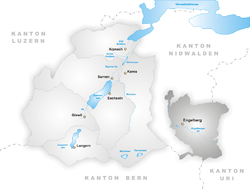Engelberg Abbey
| Engelberg Abbey | ||||||||||
| Kloster Engelberg | ||||||||||
| Imperial Abbey of the Holy Roman Empire | ||||||||||
|
||||||||||
| Capital | Engelberg Abbey | |||||||||
| Languages | Highest Alemannic | |||||||||
| Government | Theocracy | |||||||||
| Historical era | Middle Ages | |||||||||
| • | Founded | 1120 | ||||||||
| • | Gained immediacy under the Holy See |
1124 |
||||||||
| • | Gained jurisdiction over local villages |
1236 |
||||||||
| • | Swiss Congregation created | 1602 | ||||||||
| • | Annexed by Helv. Rep. | 1798 | ||||||||
|
||||||||||
Engelberg Abbey (German: Kloster Engelberg) is a Benedictine monastery in Engelberg, Canton of Obwalden, Switzerland. It was formerly in the Diocese of Constance, but is now in the Diocese of Chur. It is dedicated to Our Lady of the Angels and occupies a commanding position at the head of the Nidwalden Valley.
Founded in 1120 by Count Blessed Conrad of Seldenburen, with the first abbot being Blessed Adelhelm, a monk of St. Blaise's Abbey in the Black Forest, under whom the founder himself received the habit and ended his days there as a monk. Numerous and extensive rights and privileges were granted to the new monastery by various popes and emperors, amongst the earliest of these being Pope Callistus II in 1124, and the Emperor Henry IV. The abbey was placed under the immediate jurisdiction of the Holy See, which condition continued until the formation of the Swiss Congregation in 1602, when Engelberg united with the other monasteries of Switzerland and became subject to a president and general chapter.
...
Wikipedia


